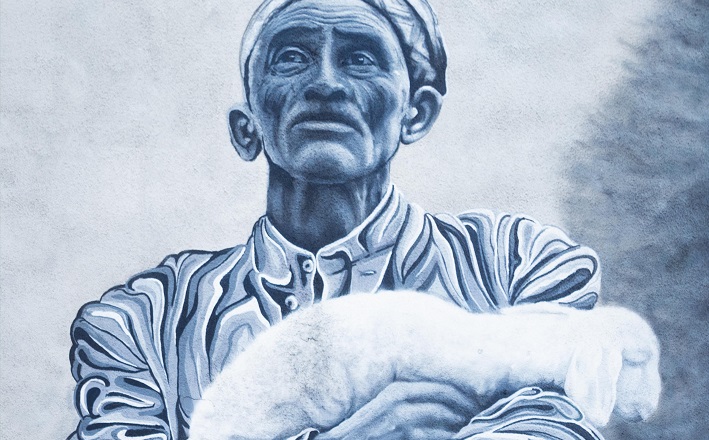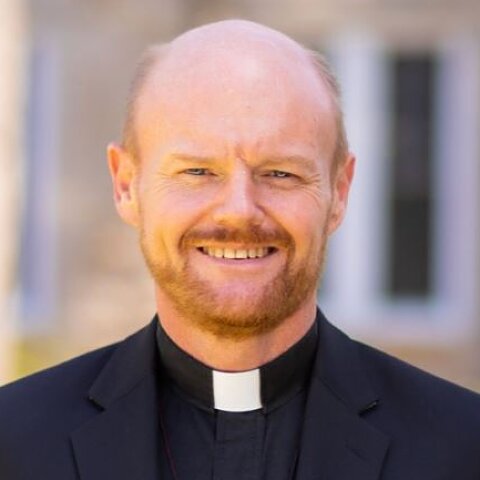Commentary on Psalm 23
Psalm 23 can and does provide calming comfort to individuals who are experiencing death within their close circle of family or friends.
The very images of a shepherd, green pastures and still waters coupled with the thought of “dwelling in the house of the Lord forever” lend themselves toward reflecting on and drawing hope and strength from the promise of eternal life through the resurrected Christ. This is a fair interpretive move, especially made through the lens of Easter and, therefore, at times of death.
Hope and reassurance are certainly at the heart of this beloved psalm. If we make these only about an afterlife at some point far in the future, however, we have only sampled the full measure of its scope and power. Psalm 23 is rooted in the real-life circumstances and experiences of the pastoral semi-nomad — a way of life that has existed from the very times of the psalm right up to the modern age.1 Therefore, Psalm 23 is far more about dynamic movement rather than quiet solitude, enduring trials rather than avoiding them, and life rather than death.
Modern western society has a largely romanticized image of the shepherd — an image to which this psalm has serendipitously contributed. The life of the Middle Eastern shepherd is, however, neither consistently quiet, easy, nor sedentary. For several months centered around the summer, there is very little or no rain in most of Israel/Palestine. And even in the rainy months of winter, some areas still struggle to get more than four to six inches annually. As a result, the pastoral life is semi-nomadic — with shepherds being able to settle for planting and (hopefully) harvesting winter wheat. However, moving about is the norm for much of the year in an effort to find ample pasturage and water, which can be quite a challenge, especially during the summer.
The land of Israel/Palestine is extremely beautiful in its own way. However, you will not find there the sprawling flat and fertile fields and green pastures of the American Midwest that go on for as far as the eye can see.2 In fact, much of the land utilized by shepherds is quite hilly and rocky.3 As a result, the daily task of tending flocks, who tend to venture widely, requires constant attention and can be dangerous because of both terrain and predators.
So while the shepherd may occasionally experience picturesque solace and repose, it is more the exception than the rule. Upon close examination, Psalm 23 reflects the movement, both daily and annually, that the pastoral semi-nomad would know well. To be made to lie down in green pastures presupposes having been brought there in the first place — motion which is commensurate with being “led” beside still waters (verse 2). Leading in right paths (verse 3) and walking (verse 4) also point to movement. Even the verbs “prepare” and “anoint” (verse 5) and “follow” (verse 6) point away from quiet and still toward activity.4
A crucial part of the movement of this psalm that is often minimized — perhaps unintentionally — is the movement which occurs in verse four. The traditional translation “through the valley of the shadow of death” contributes to the psalm’s common funerary use. However, the NRSV’s “through the darkest valley” is better because it does not unnecessarily limit the language, and our interpretation of the verse, to literal death.
The psalm here is not just (or perhaps even at all) referring to end-of-life death and the hereafter, but experiences in the course of this life that are deep and dark — some even so much so that they hint at or threaten death. Thus Psalm 23 is not about a disposition that can or even hopes to avoid difficulties and dangers in life. Instead, it is upfront about the fact that the movements of life will include going through deep, dark valleys.
By viewing the valley of verse 4 in this way, it becomes readily apparent that the rest of the psalm addresses not so much the time when we are “ready to lay our burdens down,” but the everyday, even ordinary, experience of life. Green pastures and still waters are not just for the sweet by and by, but for the here and now. Our soul, our “life force” (Hebrew nefesh) need not wait until the other side of the grave to be restored or renewed or refreshed. Here we have a God who offers, who has promised to the point that the psalmist can confidently speak of them, these things in daily life.
When it is summer, and the water and the pasturage are hard to find, and the shepherd is tired and the sheep are thirsty and hungry, and a deep, dark valley lies ahead — these are the times when we need to, and according to this psalm, can know that peril and evil pose no ultimate and lasting threat. It is especially during these times that God becomes our shepherd and makes sure that we lack nothing (verse 1), adding to green pasture and still water a prepared table and abundant anointing oil.
God’s goodness and mercy never simply follow at a distance, and certainly don’t maintain some kind of holding pattern until we breathe our last. Instead, God’s goodness and mercy “pursues”5 us, actively seeking to engage us and refresh our lives. In addition, God’s goodness and mercy does this “all the days of my life” (verse 6).6
The psalm’s closing puts the final touches on a message that is more about life than death. Though traditionally rendered “and I shall dwell in the house of the Lord forever,” the Hebrew is literally “and I shall return into the house of the Lord for length of days.”7 Again, this meshes well with the annual, even lifelong movement, coming and going, leaving and returning that pastoral semi-nomads would have known. Equally for us as we go to and fro in this life, for as long as our days last, God brings us back into the divine presence from whatever would seek to separate us.8
Psalm 23 speaks to us in this Easter season to reinforce that the risen Christ promises not only to greet us in the midst of and beyond death, but shall also appear to and meet us behind the locked doors and in the dark valleys of our lives. We look eagerly to experience resurrection life beyond the grave. But let us not overlook the resurrection life — the very refreshing of our souls — that the risen Christ offers daily to those who follow him.
Notes:
Although, sadly, it is a way of life that is on the verge of disappearing as governments have worked over the past several decades to steer the Bedouin toward a more settled, sedentary way of life.
The Coastal Plain, Shephelah, Jezreel Valley and even the Galilee do have flat, fertile areas that can become very green, but the scale — given that the whole of Israel/Palestine is not much larger than the state of New Jersey, is not even close the multi-thousand acre farms with which we are familiar.
Such as the Judean and Samaritan Hill countries, and even the Judean Wilderness.
Joel LeMon also lifts up the significant movement characteristic of this psalm in his 2015 commentary: https://www.workingpreacher.org/preaching.aspx?commentary_id=2372
A much better translation of the Hebrew radaf, reflecting the active and persistent sense of the verb.
This need not exclude the day of our death — but it clearly is not limited to it either!
The Hebrew verb is shuv, not yashav.
And again, this, particularly in light of Easter, means in the midst of and after death as well.


May 12, 2019